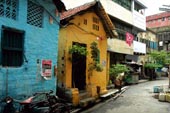 |
| MINT WITH A DIFFERENCE: The factory (both the green and yellow tiled structures) on Simla Street, in north Calcutta, where police came across 183 kg of coins in gunny bags. Picture by Bishwarup Dutta |
The metal that goes into the making of Indian coins is used for making shaving blades in Bangladesh.
This came to light after police on Friday morning stumbled upon a factory on Simla Street, under Girish Park police station, where coins were melted and the metal used for manufacturing small rods.
The three men who were arrested on the factory premises told the police that the rods are smuggled to Bangladesh, where they were melted again for the production of shaving blades.
“The metal in a one-rupee coin can yield five blades, each priced at Rs 4 in Bangladesh,” said an officer of Girish Park police station.
Pintu Das, Manobrata Das and Mohan Lal Shaw have been booked for “changing the nature of the Indian currency”, a non-bailable offence punishable with seven years’ imprisonment. The factory was owned by Pintu Das.
The raiding team came across thousands of coins stacked in gunny bags at the factory. The coins, mostly of the denomination of 50 paise, Re 1 and Rs 2, weighed 183 kg.
“The unit was operating for the past couple of years. We suspect there are several such factories across the city and in its adjoining areas,” the officer said.
“The accused had engaged a number of agents to collect coins from small traders. The rods used to be sent to Bangladesh through a network of smugglers,” said P.K. Chatterjee, deputy commissioner of police (headquarters).
The police drive followed a complaint from Reserve Bank of India about an “unprecedented” shortage of coins in the city. To cope with the problem, the bank has been running mobile counters in several places to supply coins against notes.










